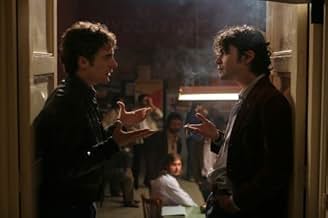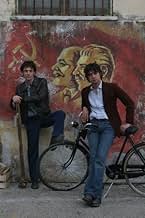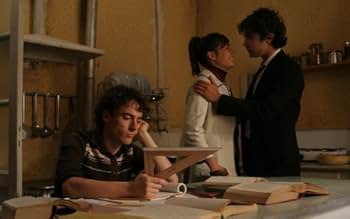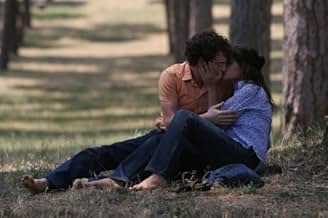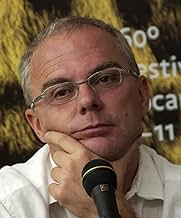AVALIAÇÃO DA IMDb
7,0/10
6,9 mil
SUA AVALIAÇÃO
Adicionar um enredo no seu idiomaTwo brothers come of age in a small Italian town in the '60s and '70s.Two brothers come of age in a small Italian town in the '60s and '70s.Two brothers come of age in a small Italian town in the '60s and '70s.
- Direção
- Roteiristas
- Artistas
- Prêmios
- 19 vitórias e 29 indicações no total
Antonino Bruschetta
- Segretario Bombacci
- (as Ninni Bruschetta)
Avaliações em destaque
This film is a dilemma for me. The first half just bounced along. The music was perfect. The energy pulled me along with it, seeing what felt to me like real people's insight into the serious subject matter. Interesting subject matter, interesting characters with motivation, who I cared about. You do laugh at things, even when serious stuff is going on most of the time. I didn't think it could get any better.
And then in a blink of an eye (about an hour in, maybe), it all went to pieces. It dawdled slowly through clichés. I felt like I knew what was coming, and I didn't even care. It was implausible, and at times boring enough for me to lose concentration.
Part of the problem is that it is (as another reviewer noted) about 20 minutes too long. How come are there film directors - talented ones - who haven't yet noticed that 90 minutes is generally enough? 8/10 for the brilliant first half.
And then in a blink of an eye (about an hour in, maybe), it all went to pieces. It dawdled slowly through clichés. I felt like I knew what was coming, and I didn't even care. It was implausible, and at times boring enough for me to lose concentration.
Part of the problem is that it is (as another reviewer noted) about 20 minutes too long. How come are there film directors - talented ones - who haven't yet noticed that 90 minutes is generally enough? 8/10 for the brilliant first half.
The first 30 minutes or so made me hope for the best. Elio Germano is an actor with an extraordinary power to grab his audience and make us care, plus, the film seemed to move away from the (very good) book it is based on and go for the most engaging comedic aspects of the story. I knew it was too good to be true. Shortly after the film falls in a series of common places robbing us from the possibility to be surprised, engaged or even care. I wonder why it is that we - in Italy I mean - feel the need to visit the past though the same identical paths. To tell you the truth, I'm sick and tired of it. Can we tell stories that live out of its own strength. Politics, intellectual reflections without any, real, base on reality. We are known for protesting at a bar table, maybe go to a demonstration but at the end of the day we are going to do what we're told. Honestly or dishonestly. Could it be that, this relentless film revisions, is a tacit way to justify the fact that we've been so ineffectual in real life. We've been through everything and more but nothing has really changed. We're better identified by the Alberto Sordi characters like the one in "La Grande Guerra" by the great Mario Monicelli. My question is: If I, as an Italian, couldn't care less about the political mismatch of two Italian brothers, imagine the rest of the world. How confusing and ultimately annoying way to tell a story. There was a sort of uproar today, knowing that this film had not been selected for the official selection at the Cannes Film Fest. Hey, come on, think again. Why should it be? There is absolutely nothing new in it. Nothing! Riccardo Scamarcio continues to sleep walk through his film roles. He is beautiful but not nearly as magnetic as Elio Germano. I hope we'll wake up soon and realize that we won't change the past by revisiting it. That we are who we are and should look ahead to see what happens.
'My Brother is an Only Child' tells the story of two red-blooded siblings as they take their first steps into political and sexual adulthood in the Italy of the 1960s. It's an intriguing premise, but for me, it didn't quite come together. Specifically, the fascism and communism that its protagonists pursue seem obviously unappealing: the film fails to convey how anyone could follow such causes except out of immaturity, though there are some funny moments (the new leftist lyrics to Beethoven's Ninth Symphony the most obvious of them). At the end of the film, a housing scandal is exposed, but the film doesn't really explain how the scam had worked: the story would make sense if the houses in question hadn't actually been built, but in fact they have been, and one senses that the writer has resolved a happy ending without worrying too much about the details. What's nice about this film is its portrait of a place and a time, and the very believable love-hate relationship between the brothers; but if you weren't there yourself, perhaps its inevitable that you find yourself looking in from the outside.
The political backdrop of this 60s character drama is both nostalgic and frightening - that disaffected and rebellious Accio finds himself so easily taken in by a Fascist mentor strikes parallels with the our own young men turning to extremism or street violence in a search of identity. Accio clashes dramatically with his older brother, the hip, good-looking communist, but the story not so much about political ideals as their expression of familial jealousies and personal moral development.
The tensions and affections of this struggling working class family, portrayed by all with genuine emotion. The dialogue is witty and charming and not unlike other memorable Italian films (Il Postino, Cinema Paradiso) the characters come across almost too resoundingly. This gives the film a well-crafted theatrical quality, that is engaging, well-paced and very satisfying.
The tensions and affections of this struggling working class family, portrayed by all with genuine emotion. The dialogue is witty and charming and not unlike other memorable Italian films (Il Postino, Cinema Paradiso) the characters come across almost too resoundingly. This gives the film a well-crafted theatrical quality, that is engaging, well-paced and very satisfying.
MY BROTHER IS AN ONLY CHILD ('Mio fratello è figlio unico') is a title that may confuse the casual movie viewer, but it is an apt summation of the rigorous story that this excellent Italian film by Danielle Luchetti (adapted from a novel by Antonio Pennacchi) represents - the coming of age of two brothers in the confusing and turbulent 1960's and 1970's in Italy. While the film deals with the myriad political factions that disrupted life especially among the students of that era, the main focus of the story is the indomitable brotherly love that bonds the two main characters.
Accio Benano (Vittorrio Emanuele Popizo) as a child is a mischief maker who has entered seminary to become a priest, but his innate search for truth and meaning soon finds him returning home to his little family in a Mussolini-fabricated town called Latina, a village built on promises of communal well-being (a housing project was built but the poor villagers are refused access to it), but languishes in the poverty of lost hopes and deflated spirits. Accio's father, mother, younger sister and older brother Manrico (Riccardo Scamarcio) are making ends meet, but are frustrated with the political oppression of the working class. Time passes and the older Accio (Elio Germano) comes under the influence of Mussolini's 'idealism' with the tutelage of his older friend Mario (Luca Zingaretti) and embraces Fascism while Manrico has aligned with the communists, and it is this dichotomy of belief that sets Accio apart from his brother as well as his family who are communist sympathizers. Accio's personality places him in harms way with the law, with women (he has longings for the women in both Mario's and Manrico's lives), and ultimately with turns of events that threaten to pit brother against brother. The resolution of these conflicts makes for a fascinating study of familial ties, brotherly love, and a keenly observed sociopolitical history of Italy that is as enlightening as it is entertaining.
While Germano and Scamarcio are the obvious stars of this well acted film, the supporting cast (including such fine actors as Angela Finocchiaro, Massimo Popolizio, Alba Rohrwacher, Anna Bonaiuto, and Diane Fleri) is uniformly strong. This epic film demands full attention to the script (Italian with English subtitles) to follow the various political differences, but the tenor of the film is one of the excitement and concomitant love of two brothers coming of age in the best Italian style! It is a joy to watch and a lesson in history about which we should all be aware. Grady Harp
Accio Benano (Vittorrio Emanuele Popizo) as a child is a mischief maker who has entered seminary to become a priest, but his innate search for truth and meaning soon finds him returning home to his little family in a Mussolini-fabricated town called Latina, a village built on promises of communal well-being (a housing project was built but the poor villagers are refused access to it), but languishes in the poverty of lost hopes and deflated spirits. Accio's father, mother, younger sister and older brother Manrico (Riccardo Scamarcio) are making ends meet, but are frustrated with the political oppression of the working class. Time passes and the older Accio (Elio Germano) comes under the influence of Mussolini's 'idealism' with the tutelage of his older friend Mario (Luca Zingaretti) and embraces Fascism while Manrico has aligned with the communists, and it is this dichotomy of belief that sets Accio apart from his brother as well as his family who are communist sympathizers. Accio's personality places him in harms way with the law, with women (he has longings for the women in both Mario's and Manrico's lives), and ultimately with turns of events that threaten to pit brother against brother. The resolution of these conflicts makes for a fascinating study of familial ties, brotherly love, and a keenly observed sociopolitical history of Italy that is as enlightening as it is entertaining.
While Germano and Scamarcio are the obvious stars of this well acted film, the supporting cast (including such fine actors as Angela Finocchiaro, Massimo Popolizio, Alba Rohrwacher, Anna Bonaiuto, and Diane Fleri) is uniformly strong. This epic film demands full attention to the script (Italian with English subtitles) to follow the various political differences, but the tenor of the film is one of the excitement and concomitant love of two brothers coming of age in the best Italian style! It is a joy to watch and a lesson in history about which we should all be aware. Grady Harp
Você sabia?
- CuriosidadesTaken from the novel "Il fasciocomunista", the title has been changed in "Mio fratello è figlio unico" as a tribute to the eponymous song by Rino Gaetano.
- Trilhas sonorasSul mio carro (Chariot)
Performed by Sonia Cruceru
Principais escolhas
Faça login para avaliar e ver a lista de recomendações personalizadas
- How long is My Brother Is an Only Child?Fornecido pela Alexa
Detalhes
- Data de lançamento
- Países de origem
- Centrais de atendimento oficiais
- Idioma
- Também conhecido como
- My Brother Is an Only Child
- Locações de filme
- Empresas de produção
- Consulte mais créditos da empresa na IMDbPro
Bilheteria
- Orçamento
- € 5.000.000 (estimativa)
- Faturamento bruto nos EUA e Canadá
- US$ 255.620
- Fim de semana de estreia nos EUA e Canadá
- US$ 9.357
- 30 de mar. de 2008
- Faturamento bruto mundial
- US$ 12.894.062
- Tempo de duração1 hora 48 minutos
- Cor
- Mixagem de som
- Proporção
- 1.85 : 1
Contribua para esta página
Sugerir uma alteração ou adicionar conteúdo ausente

Principal brecha
By what name was Meu Irmão é Filho Único (2007) officially released in India in English?
Responda





